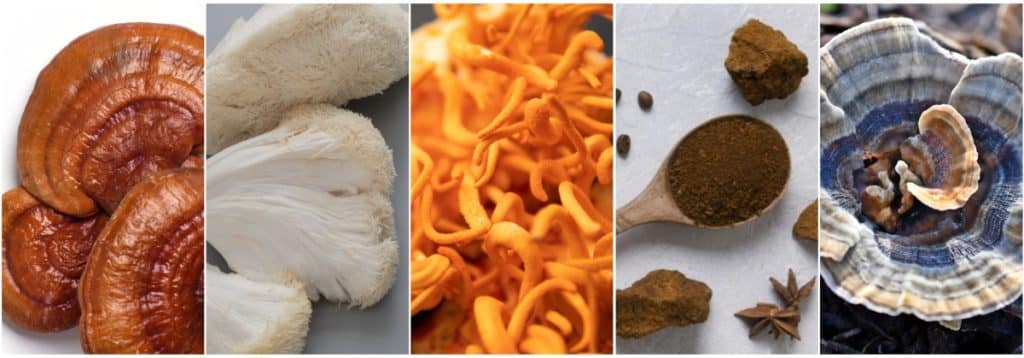Many people live fast-paced, stressful lifestyles, and mental health issues, including anxiety and depression, are becoming more and more common.
Fortunately, a healthy diet and regular exercise can help reduce or even prevent the onset of anxiety, and for an extra boost, you can’t beat functional mushrooms.
Many mushrooms are nutrient-dense functional foods, and even regular grocery store mushrooms contain compounds that support gut and immune health, both closely linked to mood.
But when it comes to mental health, adaptogenic medicinal mushrooms provide more benefits.
These remarkable fungi contain hundreds of bioactive compounds that modulate several of the body’s organs and systems to help reduce anxiety and depression.
Read on to discover the 5 best medicinal mushrooms for anxiety and depression, how to include them in your daily routine and how they work in the body to improve mental health.

Best Mushrooms for Anxiety and Depression
Humans have known about the benefits of medicinal mushrooms for thousands of years, and even though there was no scientific evidence to back up this knowledge, traditional healers knew they could use some of them to help people with mental health issues.
And if you’re wondering which mushroom is best for anxiety?
The answer is not that straightforward, and will vary depending on an individual’s physical and mental state and unique requirements.
However, natural health practitioners commonly recommend reishi, lion’s mane or cordyceps to help with stress and anxiety.
Below, in no particular order, are five potent medicinal mushrooms that help reduce anxiety and depression.
1. Reishi
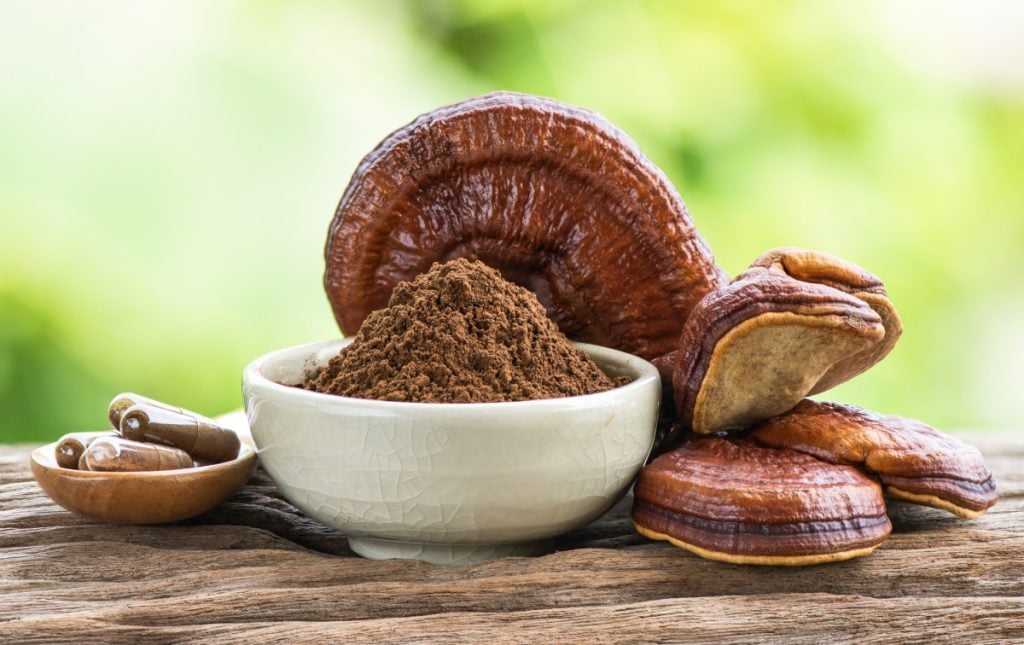
For centuries, traditional Chinese healers have used reishi mushrooms to help people relax, promote a sense of calm and reduce insomnia.
And by providing these calming effects, reishi may have also helped reduce anxiety and depression.
Until recently, there were few studies to back up these health claims, but recent animal research exploring the antidepressant, anxiolytic, and sedative characteristics of reishi extract confirms their potential calming and anti-anxiety effects.
Reishi is an adaptogenic mushroom with many bioactive compounds, and researchers believe it works in several different ways to provide relief for those with anxiety and depression.
Phytochemicals, including triterpenes, flavonoids, phenolic compounds, glycoproteins and polysaccharides, may interact with the neurotransmitters responsible for depressive-like behavior, providing antidepressant effects.
Researchers believe reishi’s antioxidants and compounds like ganoderic acid, a triterpene with potent anti-inflammatory properties, may have anti-inflammatory effects on human nervous systems, helping alleviate anxiety and depression-like behaviors.
Other studies suggest that polysaccharides, including beta-glucans, have anti-inflammatory and immunomodulatory properties that could provide rapid antidepressant effects.
Although science is catching up, more clinical trials will help scientists fully understand how the compounds in reishi work in humans and the extent of the health benefits they offer.
2. Lion’s Mane
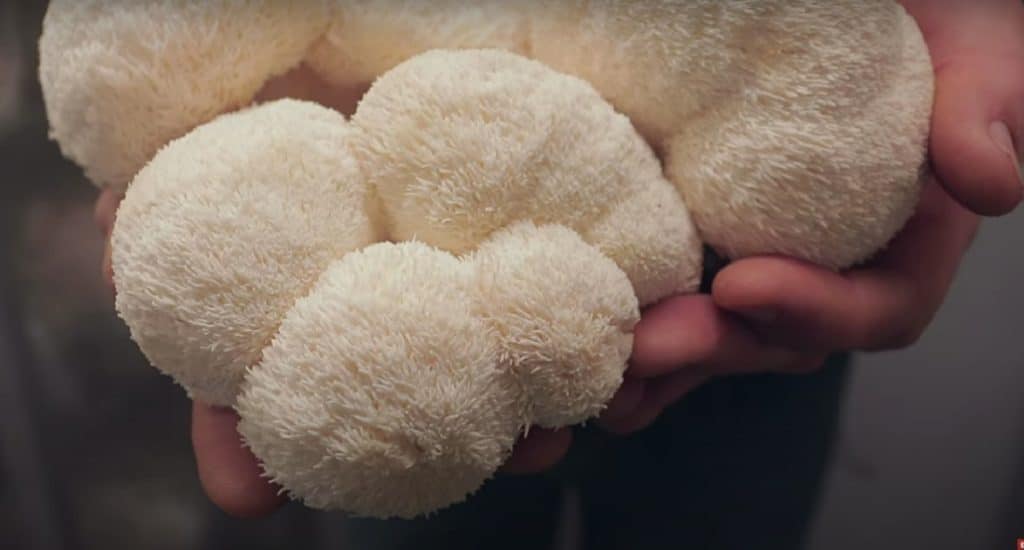
Lion’s mane mushroom provides numerous health benefits, and although best known for its ability to help improve brain function, research suggests it may also help reduce anxiety and depression.
Researchers believe lion’s manes’ antidepressant benefits may result from its anti-inflammatory properties and ability to stimulate nerve growth and increase dopamine levels.
Studies have linked lion’s mane to increased nerve growth in the brain, including in the hippocampus, which may result in fewer and less severe bouts of depression and anxiety.
Another way lion’s mane may reduce anxiety and depression is by increasing dopamine, the feel-good chemical, in the brain.
Hormones like serotonin and dopamine play an important role in mood regulation, and low levels of serotonin and dopamine may cause anxiety and depression.
Lion’s mane can reduce the activity of pro-inflammatory molecules, helping to prevent a decrease in serotonin and dopamine levels.
A 2018 animal study showed that when you placed mice in stressful conditions, their dopamine levels dropped, increasing anxiety.
However, after consuming lion’s mane extract, their dopamine levels stabilized even though the stressful conditions remained the same, suggesting lion’s mane may have antidepressant effects.
Research into lion’s mane mushrooms’ antidepressant properties is still in the early stages, and researchers need more clinical trials to fully understand how they work in humans.
However, there are a few small human studies, including a 4-week trial on 30 women and an 8-week study using 77 participants.
In both studies, participants taking extracts of lion’s mane reported lower stress and anxiety levels.
If you live in the UK and are looking for a high-quality lion’s mane supplement, check out our list of 10 of the best lion’s mane supplements in the UK.
3. Cordyceps
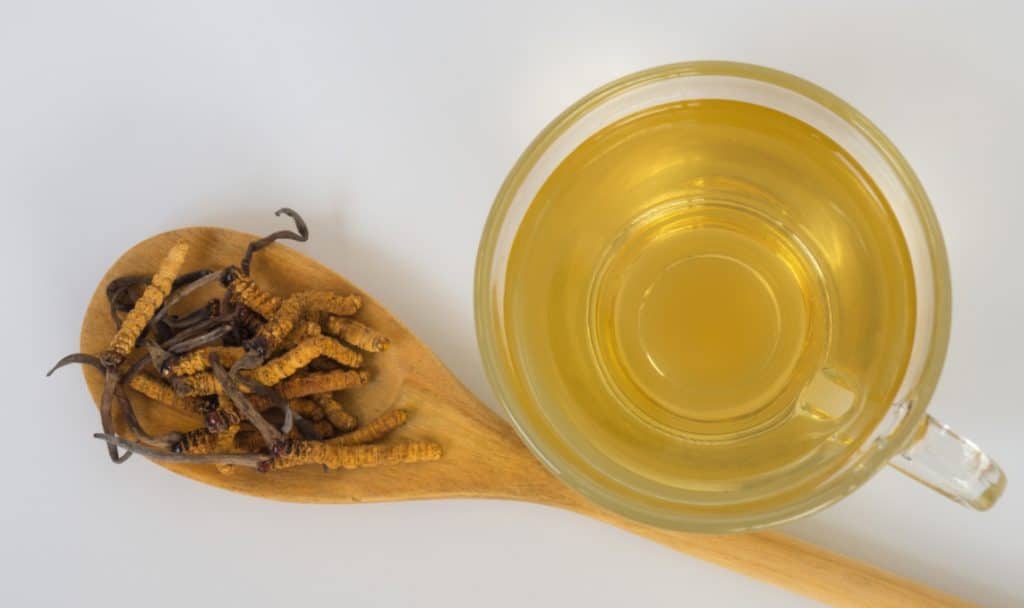
Although cordyceps is best known for boosting energy levels, enhancing stamina and reducing fatigue, its anti-inflammatory and adaptogenic properties provide many health benefits and may also help with anxiety and depression.
Animal research suggests that cordyceps may provide antidepressant-like action by regulating pro-inflammatory cytokines and modulating stress-related signaling pathways in the body.
The anti-inflammatory compounds in cordyceps may help reduce inflammation in the brain, which can help to reduce feelings of anxiety and stress.
If left untreated, chronic inflammation can lead to:
- Changes in the activity of chemicals involved in immune response, potentially affecting the balance of neurotransmitters in the brain, including serotonin and dopamine.
- An increase in the production of stress hormones like cortisol that contributes to symptoms of anxiety and depression.
- Changes in the structure and functioning of the brain. For example, a reduction in the volume of the hippocampus, a part of the brain involved in emotion regulation.
- A disruption in the communication network between the gut and the brain that’s known as the gut-brain axis. Disrupting this axis can change the gut microbiome’s composition, affecting mood and anxiety levels.
4. Chaga
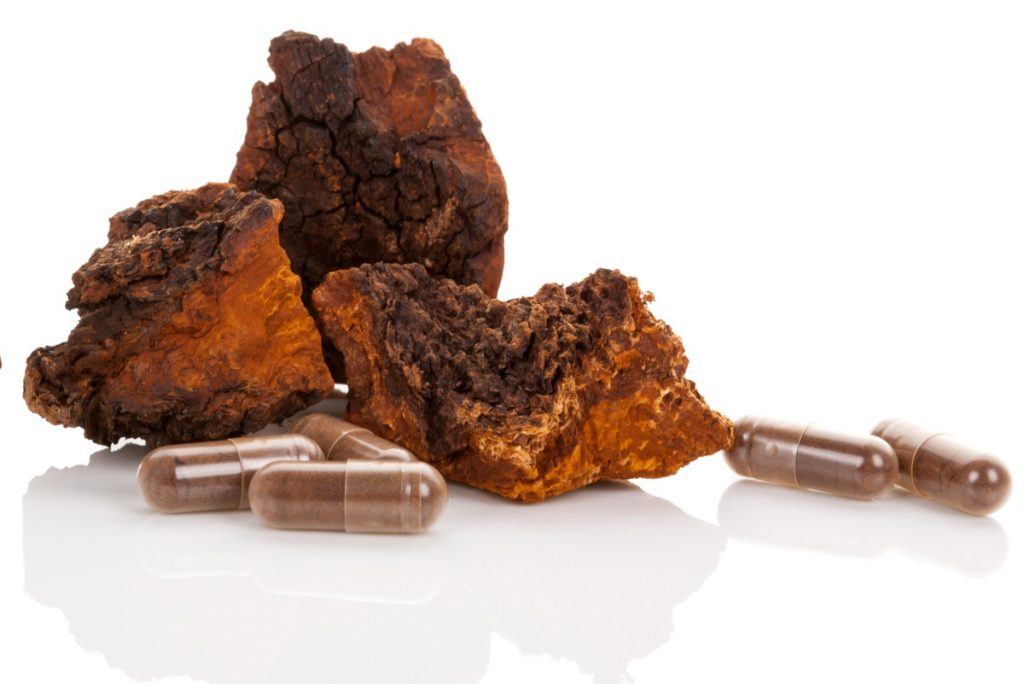
Renowned for their adaptogenic properties, chaga mushrooms provide many health benefits, including alleviating stress, improving mood, and enhancing sleep quality.
Chaga works to reduce stress and anxiety in several ways, and although several studies have improved our understanding of the role they play, there’s still a lot to learn.
Like other adaptogens, chaga assists the body in adapting to physical and mental stressors and helps restore balance by modulating the body’s immune response to these stressors.
Current studies suggest that the bioactive compounds in chaga may influence the functioning of stress response pathways, increasing emotional well-being.
They show that chaga may help reduce the impact of stress by modulating the release of cortisol, a primary stress hormone that affects mood and immune function.
In one study, cortisol levels in athletes taking chaga supplements were 30% lower than the control group, and their feelings of overall well-being were 10% higher.
Another way that chaga helps reduce anxiety and depression is by reducing oxidative stress in the body and brain that’s often linked to mood disorders.
Chaga contains loads of antioxidants that help prevent tissue damage and oxidative stress caused by excess free radicals in the body.
They do this by reducing the amount of free radicals formed in the body and scavenging or promoting the decomposition of existing free radicals.
Chaga also contains melanin that may help improve sleep quality by encouraging the production of melatonin, a hormone produced in the brain that regulates the body’s circadian rhythms and helps improve sleep.
5. Turkey Tail
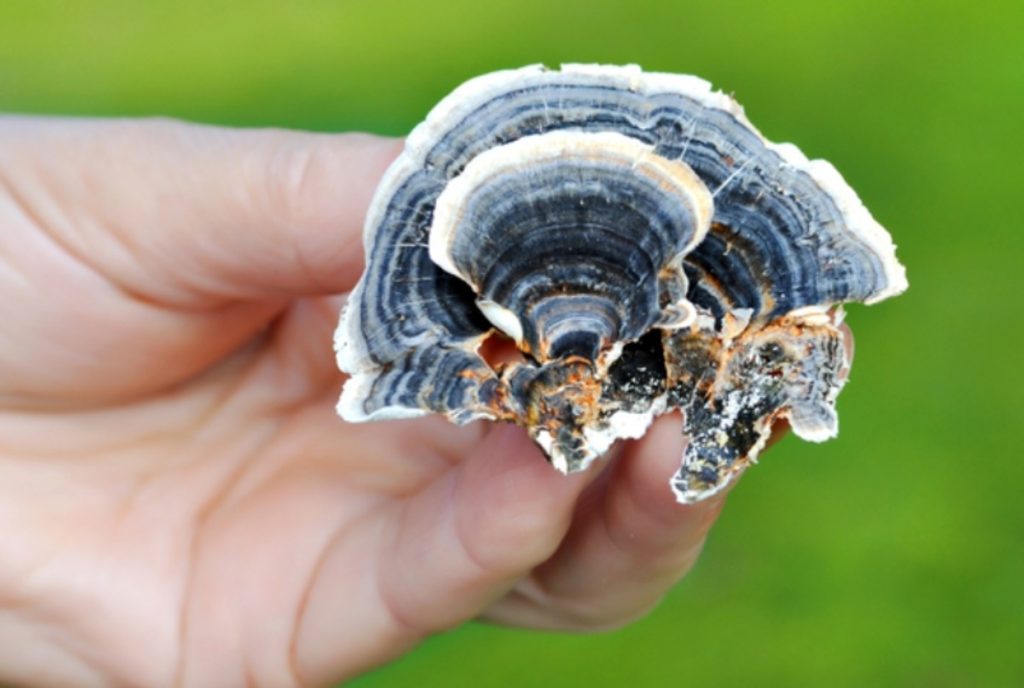
Turkey tail mushrooms are well-researched medicinal mushrooms that provide several sought-after health benefits and are commonly used as part of cancer treatment programs.
They have exceptionally high levels of beta-glucans and antioxidants that provide immunomodulatory effects and help reduce oxidative stress.
One of their active compounds is polysaccharide K (PSK), which studies suggest has anti-inflammatory and antioxidant effects that improve the symptoms of anxiety and depression.
Scientists attribute these benefits to the ability of PSK to affect neurotransmitter levels, which play a significant role in regulating mood and anxiety.
Turkey tail mushrooms also contain polysaccharopeptide (PSP) that helps reduce anxiety and depression by protecting neural pathways and combating chronic inflammation that’s closely linked to poor mental health.
How to Use Mushrooms for Anxiety and Depression
Many health-conscious people wonder, “What are the best mushrooms to eat for mental health?”
Most edible mushrooms, including shiitake, morel, chanterelle, porcini, cremini and oyster mushrooms, are low in calories and carbohydrates and high in vitamins, minerals, and antioxidants.
But, although many of the compounds they contain may assist with mood regulation, eating fresh mushrooms is not the best way to use mushrooms for anxiety and depression.
If you want maximum benefits, medicinal mushrooms are the way to go, as they’re generally much more potent than regular edible mushrooms.
But many medicinal mushrooms are woody and not great to eat, so they’re best consumed as a tea, liquid extract or mushroom powder.
When using mushrooms for anxiety and depression, extracts are best as many beneficial compounds are part of the mushroom’s indigestible chitin cell walls and humans cannot access them.
To release these compounds, you need to break down the chitin cell walls, and the best way to do this is with hot water or alcohol extraction.
Fortunately, with the increase in popularity of medicinal mushrooms, there’s now a wide range of mushroom extract powders, tinctures and capsules available to meet your needs.
Another thing to remember is that the anxiety benefits of mushrooms compound over time, and you’ll need to use mushroom extracts long-term to experience all their benefits.
Many people feel the beneficial effects after approximately two weeks of daily consumption. But, you may notice the effects after a few days, while others only feel the benefits after a few months.
Consistency is key, and we encourage you to build a daily routine for best results and ideally allow at least three months to give your mushroom supplement a chance to work.
Here are some of the best ways to use mushrooms to help with anxiety and depression, which is best for you depends on your lifestyle and personal preference.
Mushroom Tea
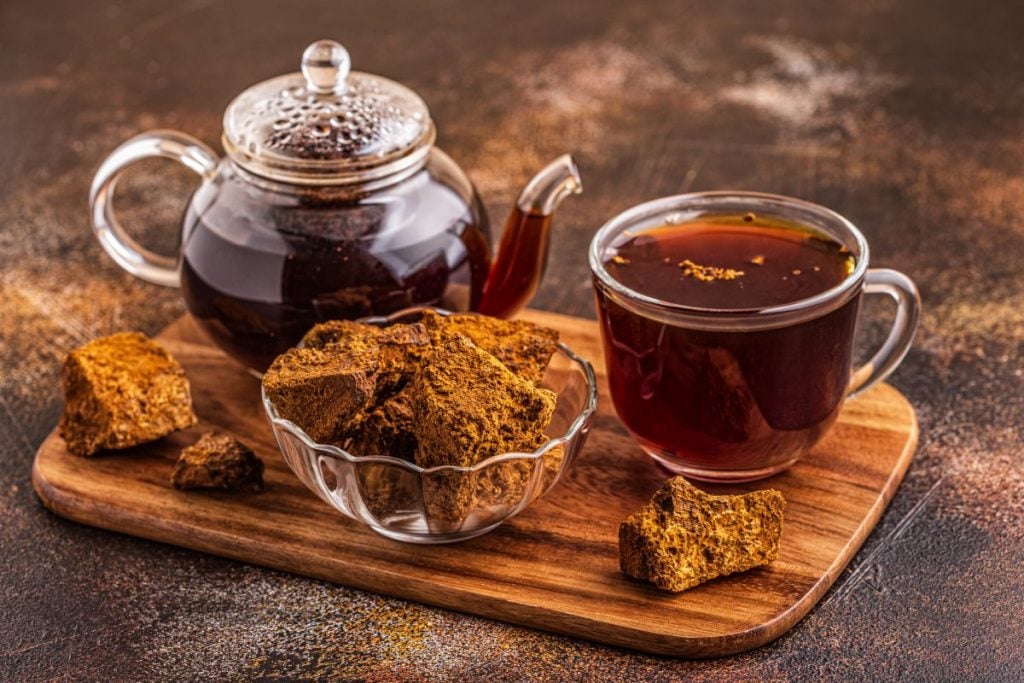
Traditionally, people consumed most medicinal mushrooms as tea, but adding dried mushrooms to boiled water and steeping them for a few minutes will not provide many benefits.
However, if you make tea by simmering the mushrooms for an hour or two, you’ll end up with a hot water extract that contains many beneficial compounds.
There are numerous mushroom tea mixes on the market, and they usually consist of medicinal mushroom extract powder blended with a type of tea to provide medicinal benefits and convenience.
To use these products, add freshly boiled water to a cup with a tea bag, cover and steep for 10-15 minutes and squeeze the tea bag well to ensure you extract maximum mushroom benefits.
Mushroom Liquid Extracts
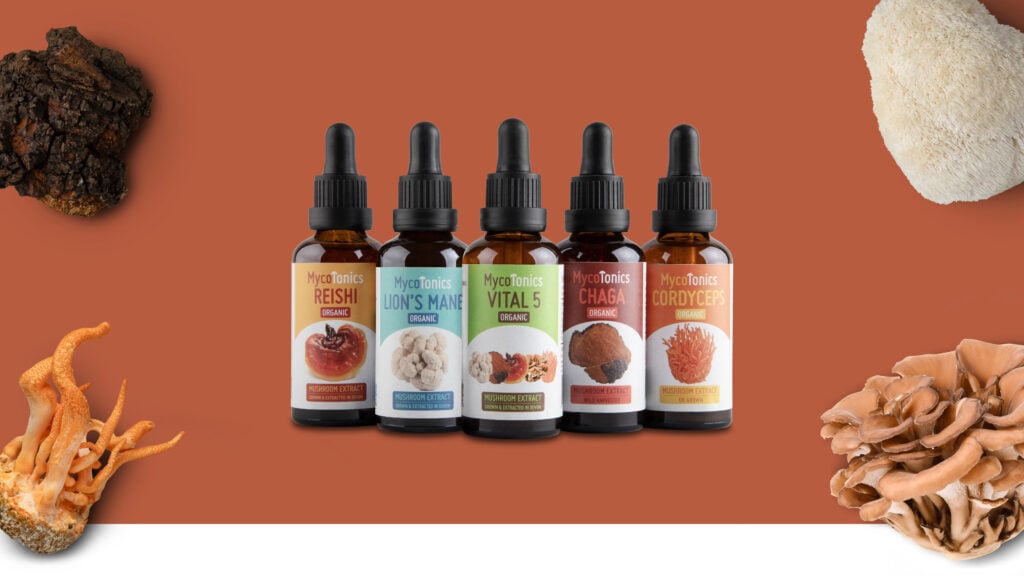
A liquid mushroom extract contains the active ingredients of medicinal mushrooms in concentrated form and provides an easy, convenient way to consume them.
Simply take a few drops under your tongue once or twice a day, and if the taste is too bitter for you, try adding a few drops to your favorite beverage.
Producers often use the words tincture and extract interchangeably, which can be confusing.
A mushroom tincture is an extract made using alcohol, usually ethanol, as a solvent to extract alcohol-soluble compounds like triterpenes, diterpenes, flavonoids & sterols from mushrooms.
But, not all extracts are made with alcohol. You can use several solvents, including vinegar, glycerin and hot water.
Hot water extraction is the most popular method for medicinal mushrooms as it draws out beneficial water-soluble compounds, including beta-glucans, alpha-glucans, proteins, vitamins & minerals.
We recommend purchasing extracts produced using the dual extraction method regardless of whether they’re marketed as a tincture or extract.
This means that the producers combined hot water and alcohol extraction to extract as many beneficial compounds as possible from the mushrooms.
Mushroom Extract Powders
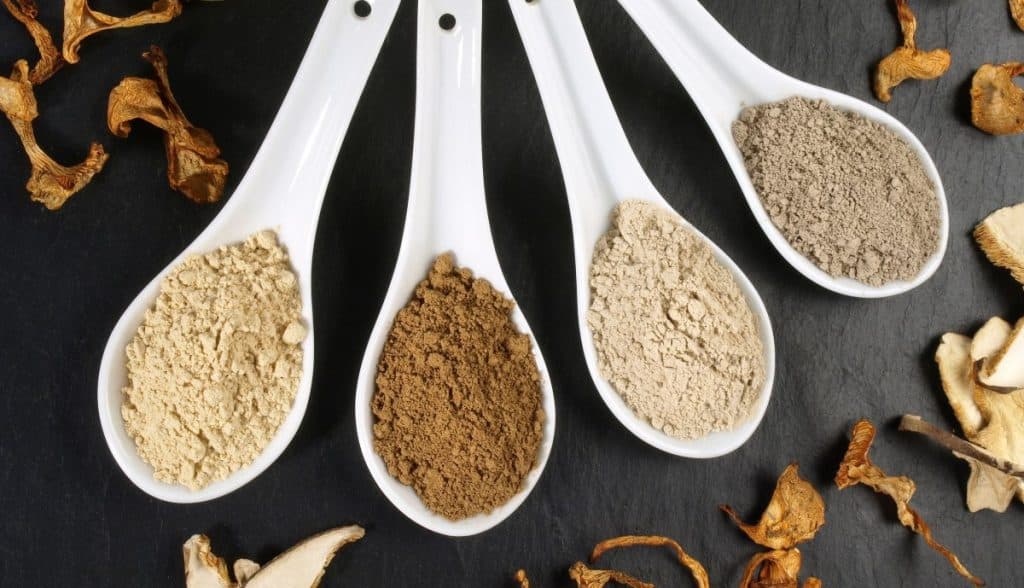
Mushroom extract powders are very versatile, making them one of the most popular mushroom supplements, but not all mushroom powders are equal.
When purchasing a mushroom extract powder, it’s advisable to check the label to ensure you are getting a dual extraction powder made using organic mushroom fruiting bodies.
There should also be no additional additives or fillers listed on the label.
To learn more about mushroom powder and how to use it, take a look at our article, “How to Use Mushroom Powder to Boost Your Health and Elevate Your Cooking.”
How do Mushrooms Help Anxiety and Depression?
Medicinal mushrooms contain numerous vitamins, minerals, antioxidants and bioactive compounds that work with various systems in the body to help reduce stress and anxiety.
Research shows the compounds in mushrooms may support mental health in several ways, including:
- Helping the body adapt to internal and external stressors
- Regulating cortisol levels
- Increasing BDNF levels in the brain for better neurogenesis
- Improving sleep quality
- Reducing inflammation
- Increasing cellular energy
- Modulating neurotransmitters
- Balancing the gut microbiome
- Supporting the immune system
Final Thoughts
Mushrooms may provide a safe, natural way to manage brain fog, cognitive decline, anxiety and depression, but for scientists to fully understand how they work, we need more clinical trials.
However, their history of use by traditional healers provides anecdotal evidence and insights that suggest they have significant mental health benefits.
Adding mood-lifting mushrooms to your daily routine is easy as they come in several convenient forms, including tea and coffee blends, mushroom powders, liquid extracts and capsules.
We recommend mushroom extracts as they’re easily absorbed, fast-acting, provide a measured dose, and are extremely easy to include in your daily routine.
Remember, the benefits of medicinal mushroom extracts compound over time, so consistency is key, and we encourage you to consume them daily for the best results.
To learn more about mushrooms, how to prepare them and their health benefits, visit our Mushroom Education Hub.
